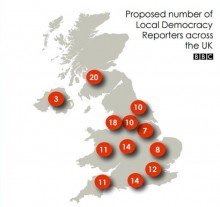The BBC’s commitment tofund 150 local democracy reporters is a little like using a sticking plaster to fix a severed limb – but it is hugely welcome nonetheless.
The deal worked out between the News Media Association and the BBC means that £8m a year out of the corporation’s £3.7bn licence fee income will be used to fund these reporters who will be embedded in local newsrooms – but have to file to all media.
Full details of BBC’s £8m-a-year scheme to fund 150 local press ‘democracy reporters’ revealed
-
With 201 district councils, 125 unitary councils and 27 county councils to cover – as well as Westminster MPs and devolved assemblies – they will have their work cut out. There’s also town and parish councils to think about.
- Local newspapers obviously cover local councils already, but sadly in nothing like as much depth as they once did.Ranged against these 150 reporters are about three-and-a-half-thousand local council press officers and communications staff seeking to control the message.
The Newspaper Society, the old trade body for local newspapers, estimated that there were around 13,000 journalists working for its members pre the 2008 financial crash. It stopped counting local newspaper journalists post 2008, but I reckon at least half have gone – probably even more.
Research by Keith Perch suggests that at big dailies like the Leicester Mercury the decline in journalist numbers is much as 80 per cent.
So the extra journalists from the BBC are a start, but we are kidding ourselves if we think they make up for the loss of at least 7,000 editorial staff.
These new local democracy reporters will have to focus on the big stories, leaving an unfilled gap where patch reporters would previously have covered parish, district and county or unitary authorities in painstaking detail.
Other solutions will need to be found if the sort of journalism that holds local power to account and enables democracy to function is to survive.







